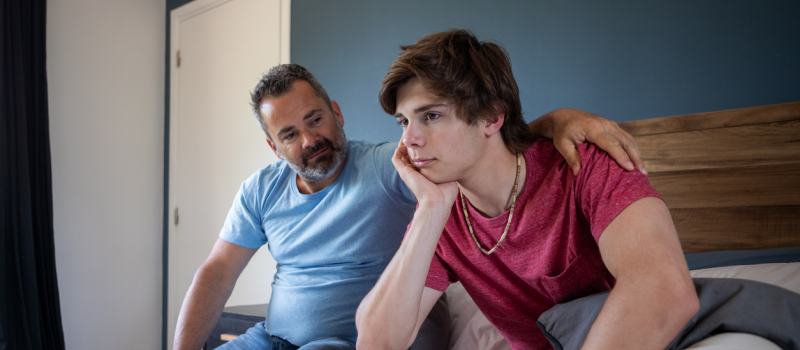
Table of Contents
Here’s What Not to Say to Someone With OCD
Written By: Charlie Health Editorial Team

Clinically Reviewed By: Dr. Don Gasparini
February 15, 2024
4 min.
Five tips for offering empathy and validation when talking to someone with obsessive-compulsive disorder (OCD).
Learn more about our Clinical Review Process
Table of Contents
When a loved one is struggling with obsessive-compulsive disorder (OCD), it can be hard to know what to say. Saying the wrong thing might make them feel worse, so it is important to be patient and avoid saying things that might upset someone, especially if they are experiencing intense OCD episodes.
Understanding the complexity of OCD, including how it differs from anxiety disorders, is essential in providing support. By identifying invalidating phrases (and knowing how to communicate with empathy and validation), you are more likely to offer a loved one the help they need.
Below, we will explore five common phrases to avoid saying to someone with OCD and explain why they are harmful. We’ll also delve into some helpful things to say to someone with OCD.

We’re here to help your loved one
Virtual, intensive care for obsessive-compulsive disorder without a waitlist.
5 things not to say to someone with OCD
It’s difficult to witness OCD in a loved one and even more challenging when you don’t know what to say to them. Saying the wrong thing might worsen feelings of isolation and invalidation, but communicating with patience and empathy will show your loved one with OCD that they are not alone. Below are five things you should not say to someone dealing with OCD.
1. “Relax” or “stop worrying so much.”
Although it may seem reasonable to you, telling someone with OCD to stop worrying so much is not an effective strategy since it oversimplifies OCD’s complexity, which can range from mild to severe OCD. Using this language can lead to the person feeling invalidated and misunderstood.
2. “It’s all in your head.”
Telling someone with OCD that “it’s all in your head” can be dismissive of people’s experiences. OCD is a recognized mental health condition characterized by obsessions and compulsions that significantly impact people’s daily lives. You overlook the seriousness of this condition by reducing people’s experiences to being merely “in their head.”
Also, research shows that there are biological processes that play a key role in obsessive thoughts and compulsive behavior. Suggesting that OCD is solely “in their head” shows a lack of understanding of the complex biological and psychological components of this mental health condition. This statement can downplay the necessity of mental health support for OCD, such as exploring the best therapy options for OCD, and contribute to the stigma surrounding it, potentially hindering people from seeking support to manage their symptoms.
3. “I’m a little OCD too.”
Comparing normal behaviors to the challenges faced by people with OCD minimizes their condition and can make them feel misunderstood. People with OCD experience intrusive thoughts and compulsions, which can sometimes manifest as OCD false memories, that are different from normal behaviors, so it is important to acknowledge the uniqueness of their experiences and offer support rather than trying to equate their struggles with your own. It’s also important to distinguish OCD from conditions like obsessive-compulsive personality disorder (OCPD), which, despite the similar name, is different.
4. “You don’t look like you have OCD.”
Telling someone, “you don’t look like you have OCD,” contributes to stereotypes about how mental health conditions should appear. OCD does not have a specific “look”—individuals with OCD can present in various ways, and it can even manifest uniquely in specific situations, such as postpartum OCD. It’s essential to recognize that mental health conditions manifest differently in each person and to avoid judging based on external appearances.

5. “Why can’t you stop?”
Asking someone with OCD why they can’t stop their compulsions can be highly insensitive. Compulsions are often ritualistic attempts to alleviate or push these obsessions away. They serve as coping mechanisms, and stopping them isn’t as simple as you may think. Instead of questioning, learning about techniques like meditation for OCD can offer insight into healthier coping strategies. It’s important to show empathy, understand their struggles, and offer support instead of expecting them to stop their rituals abruptly.
Helpful things to say to someone with OCD
Instead of using the above statements, try to offer support and validation when talking to someone with OCD. Here are some phrases that may help you communicate more effectively with someone with OCD:
- “I’m here for you.”
- “I understand this is difficult for you.”
- “Let’s find ways to manage this together.”
- “Take your time; there’s no rush.”
- “You’re not alone in this.”
Also, instead of assuming a loved one’s OCD will get better on its own, it’s important to help them connect with necessary mental health resources for OCD. You can encourage them to reach out to a mental health professional—and even be there to support them through the process if they want your help, as part of a broader strategy for improving their mental health.

OCD treatment at Charlie Health
If you or a loved one are struggling with obsessive-compulsive disorder, Charlie Health is here to help. Charlie Health’s virtual Intensive Outpatient Program (IOP) provides more than once-weekly mental health treatment for dealing with complex mental health conditions, including OCD. Our expert clinicians incorporate evidence-based therapies into individual counseling, family therapy, and group sessions. Understanding the secrets to successful family therapy can be beneficial when it’s part of the treatment plan. With treatment, managing OCD behavior and thoughts is possible. Fill out the form below or give us a call to start healing today.




